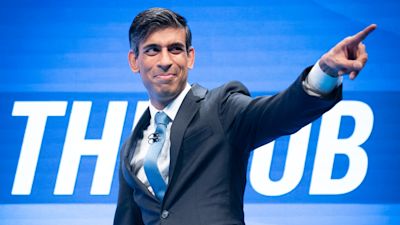Insight
Why the Chancellor is determined to push ahead with ending the Universal Credit uplift

ITV News Deputy Political Editor Anushka Asthana sums up the main policies in Boris Johnson's speech and asked fellow Tories what they thought of it
Boris Johnson has a vision for levelling up the country that involves creating jobs, boosting skills and allowing labour shortages to push up wages.
But it does not involve maintaining the Universal Credit (UC) uplift of £20 a week first brought in in March last year - which in political terms may seem odd.
After all, it means the prime minister gave a speech all about reducing regional inequalities on a day that a benefit cut hit the north of England significantly harder than the south.
So why are they so determined to push ahead with this shift?
After a week spent chatting to ministers, including members of the Cabinet, I got a sense of some of the key thinking around this.
Firstly, it is simply the cost. According to those who know Rishi Sunak well, he sees it as a choice. £5-6 billion on Universal Credit or thousands more police officers and nurses.
He also sees it as a point of principle. The uplift was temporary and he believes that chancellors must be able to make short-term changes in the face of major economic shocks - in this case the pandemic.
And he believes that Tory MPs, who have seen the scale of tax rise needed to fund the NHS backlogs and social care, are tending to back spending restraint right now.
Beyond that is the politics. While it may seem to many that cutting Universal Credit is politically tough for the Tories – I think some of them see it as the opposite.
One Cabinet minister, with a high proportion of constituents on UC, said to me he hadn’t received a single letter complaining about the change - and that many local voters would be against more money for benefits.
That, he said, is despite acknowledging that many of the people receiving the benefit are in work.
And so, they are pretty unapologetic about pushing ahead, and I don’t think that the Department for Work and Pensions’ latest attempt to put more money into UC (by reducing the taper rate – the rate at which the benefit is withdrawn as you enter the workforce and increase your hours/salary) is looking likely at all.
But some would argue that position is inconsistent when you consider that the chancellor also says that his forthcoming spending review and budget will make clear that austerity is no more.
They say that the current levels of Universal Credit are a legacy of austerity.
That is because George Osborne – as chancellor – put less money into the flagship welfare benefit than its architect, Iain Duncan Smith, wanted right from the start. I remember writing about tensions between the DWP and Treasury over UC back in 2010.
Then in 2015, when Osborne tried to cut tax credits but was forced into a humiliating u-turn, the u-turn did not apply to future UC rates. So as people moved from tax credits to UC they faced a pretty big cut.
Overall, people in low paid jobs - including care workers, postal workers, hairdressers and more – who have benefit top ups have lost a lot of money over a decade.
Campaigners would say the £20 uplift simply brought people to a position that they needed to be at.
But when the PM pushed ahead with his levelling up speech on the day of the benefit cost – it became very clear that battle had been lost.